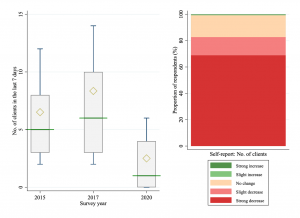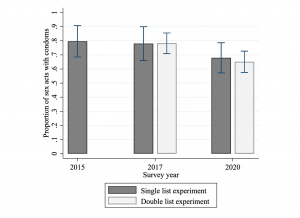Why COVID-19 may lead to an increase in HIV/AIDS in Africa: Lessons from a cohort study of female sex workers in Senegal
By Aurelia Lepine, on 3 November 2020
UCL new research found that the COVID-19 crisis has severely reduced earnings of female sex workers in Dakar, Senegal. Survey evidence suggests that a significant proportion of female sex workers have resorted to unprotected sex, which is more lucrative, as a response to this economic shock. The decline in condom use is particularly marked among poorer female sex workers. Policies targeting sex workers to dampen the adverse economic impact of the COVID-19 crisis should urgently be considered as a strategy to pre-empt the development of sexually transmitted infections and HIV/AIDS.
Developments of the COVID-19 pandemic in Senegal
Senegal was one of the first African countries to detect a COVID-19 case on 2 March 2020. The Senegalese government responded rapidly by introducing a night curfew, enforcing self-isolation measures, banning public gatherings, closing borders and prohibiting inter-regional travel. On 23 March 2020- within three weeks of the first known case- a national state of health emergency was announced and night curfew from 8pm to 6am was implemented till 30 June 2020. An emergency plan of CFAF 1000 billion (1·6 billion USD, 7 percent of GDP), within which CFAF 69 billion was allocated for urgent food aid, was put into action. The prompt and proactive pandemic response by the Senegalese government has thus far managed to keep COVID-19 case counts relatively controlled.
How severe was the impact for female sex workers?
COVID-19 pandemic has the potential to be the most severe and long-lasting economic shock experienced by female sex workers globally due to the high and close contact nature of the profession. To quantify the economic impact of this shock of female sex workers in Dakar, Senegal, we compared the outcomes of a cohort of approximately 600 female sex workers across survey years collected before (wave1: 2015, wave 2: 2017) and during COVID-19 pandemic (wave 3: 29 June – 28 July 2020). We also elicited from the respondents how COVID-19 has impacted them.
Drastic drop in sex work earnings
65% of the respondents reported that their income from sex work has strongly decreased because of COVID-19. Comparing across the three survey waves, sex work earnings have plunged across the board in 2020. Mean monthly sex work earnings in 2020 has halved. Mirroring the severe fall in sex work earnings, mean monthly total household expenses of respondents shrunk by more than 40%.
Effect of COVID-19 on sex work earnings of female sex workers in Dakar
Notes: (LHS) The green line represents the median. The box represents the interquartile range. The top and bottom whiskers represent the 10th and 90th percentiles respectively. The diamond represents the mean. (RHS) Female sex workers were asked to self-report the effect of COVID-19 on sex work revenues.
Drastic drop in number of clients
The collapse in sex work earnings was attributable to the steep reduction in the number of clients, with almost 70% of respondents reflecting that COVID-19 has strongly reduced the number of clients. The mean number of clients in the last seven days before the 2020 interview plummeted dropped by 70%. The number of days between a respondent’s last client and her participation in the survey also markedly increased in 2020, further indicating that the frequency at which female sex workers get work has fallen dramatically.
Effect of COVID-19 on the number of clients of female sex workers in Dakar
Notes: (LHS) The green line represents the median. The box represents the interquartile range. The top and bottom whiskers represent the 10th and 90th percentiles respectively. The diamond represents the mean. (RHS) Female sex workers were asked to self-report the effect of COVID-19.
Reduction of condom use as a response to COVID-19 economic shock
Estimates showed that condom use prevalence with the last clients of female sex workers were very similar in 2015 and 2017, but saw a huge decline of 17% in 2020. This decrease was concentrated among asset-poor female sex workers, who had a 27% decline in condom use. This suggests that unprotected sex, typically remunerated twice more than protected sex in Dakar, was used as a coping mechanism for the economic shock resulting from the COVID-19 crisis.
Effect of COVID-19 on condom use with last client estimates of female sex workers in Dakar
Notes: The list experiment method was used to elicit condom use as direct elicitation of condom use is grossly misreported. A single list experiment was implemented in all three survey waves, while a double list experiment, which reduces the standard errors of the prevalence estimate greatly, was implemented only in the latter two waves. The bars represent the mean estimate of the prevalence of condom use. The whiskers represent the 95% CI of this estimate.
What next?
Despite the fall in condom use, there has been no accompanying increase in the proportion of respondents reporting STI symptoms during the sex act with at least one of their last two clients. This is possibly due to the fact that there are now much fewer clients, acting a counterbalance to the increase in risk per client.
What would be of importance is whether this reduction in condom use would persist after client numbers increase. The data suggests signs that debt accumulation could be an alternative way for female sex workers to cope with the economic shock, as the fall in condom use was concentrated among those who were not indebted in 2020. This hints at the possibility that if the economic shock were to be further prolonged, female sex workers may hit a borrowing limit, causing condom use would further decline. In addition, it implies that even after client numbers recover, there could still be persistence in risky sex behaviours if female sex workers had to pay off the debt they had incurred during the crisis. If this were to happen, this has the potential to create a grave public health issue, underscoring the importance of looking into economic and public health policies to target vulnerable female sex workers who are particularly reliant on sex work earnings. However, additional evidence would also be required to assess the effectiveness and value for money of such economic interventions (e.g. food vouchers, cash assistance, microfinance).
Link to the working paper.
 Close
Close





